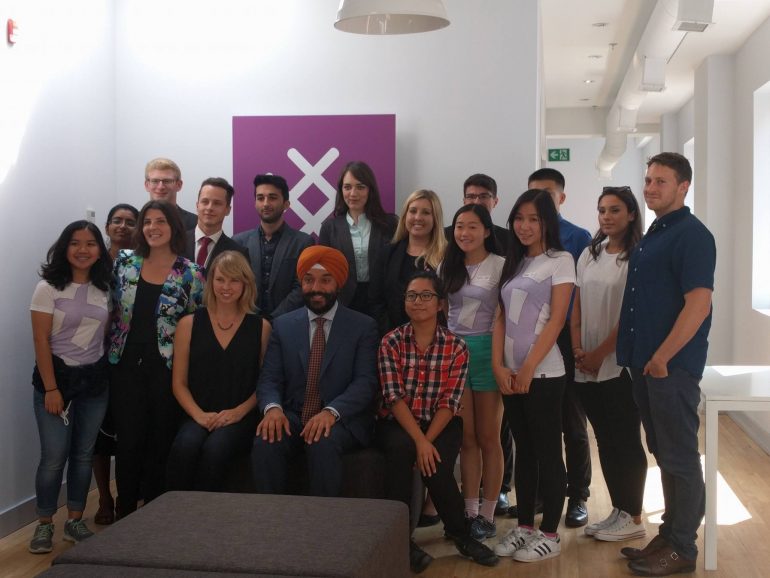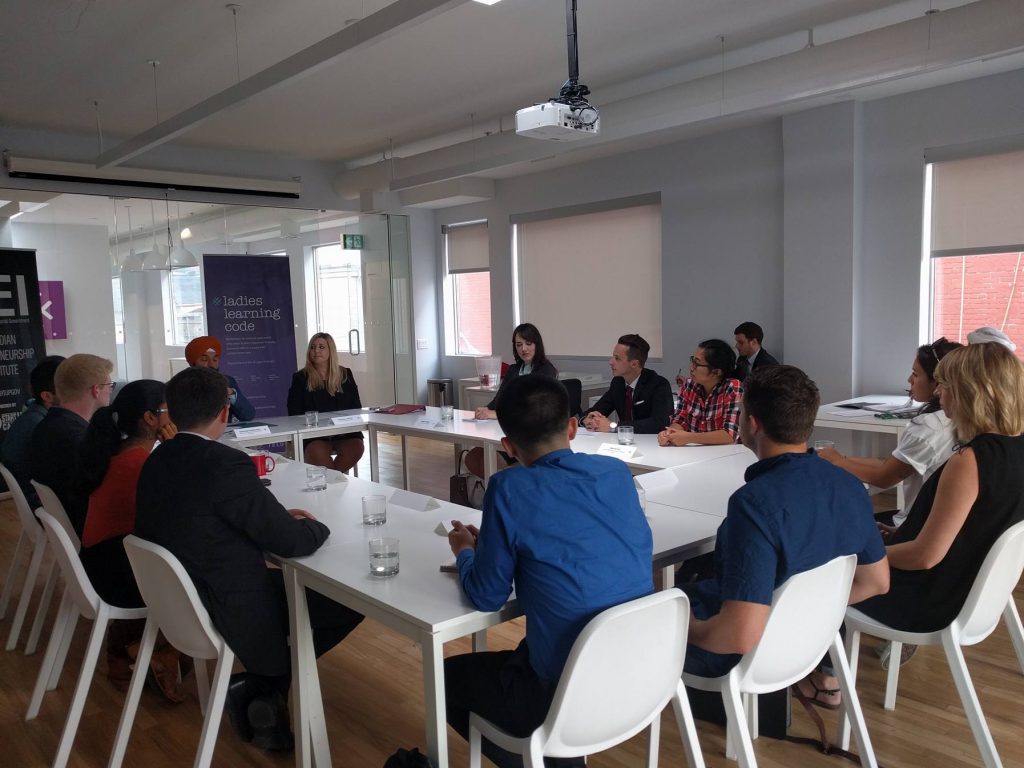While the government released its official budget — including several million-dollar commitments to the startup community — in March, Minister of Innovation, Science and Economic Development Navdeep Bains has been touring the nation seeking public input as the government figures out how best to shape Canada’s innovation strategy.
From Twitter chats to talks with prominent entrepreneurs, Bains has been on a mission to cover everyone’s concerns when it comes to drafting Canada’s innovation strategy. On Wednesday, Bains made a stop at Ladies Learning Code to reach out to another burgeoning group of entrepreneurs — youth entrepreneurs. Hosted by Startup Canada, Bains sat down for a roundtable discussion with entrepreneurs who started companies as young as 16 to discuss the gaps that they experienced in running their businesses.
“You can build a nice building and low regulations and tax rates, but without people you aren’t going to have success. We have to focus on talent. That’s one area that is a common theme throughout,” said Bains. “We’re also looking at issues in scaling up and growing; we want to see you succeed in Canada and become global champions. And how do we invest in adoption, digital literacy, digital trading, and the work you do with coding. How do we focus on that and become Canada 4.0?”
Kicking off the roundtable, a few of the entrepreneurs pointed out that younger entrepreneurs face barriers from the start due to their age. Andre Bertram, who recently won $30,000 at the CNE Innovation Garage with co-founder Frank Nguyen, said that they had trouble securing funding for Helpwear because of their age.
“We’re 18 now, but when we started we were 16 and 17, and one of the roadblocks besides reputability was the fact that every piece of infrastructure the government had designed for youth were for people 19-27,” said Bertram. “And as two young people, to get funding signed was very difficult.
While a lack of senior talent is something that many entrepreneurs complain about, Ronen Benin, CEO and co-founder of Right Blue Labs, said that affordable senior talent was also a challenge. “We’re at a point where the people we want to hire are expensive and these people are working abroad. We can’t afford these types of people, and I don’t see how we can afford them unless we raise a large round,” said Benin.
Sage Franch, founder of Trendy Techie, said that supports should be in place for young people to think about entrepreneurship as early as middle school.
“The girls and youth I mentor are in middle school or early university, and it’s very difficult to find programs. We see a lot of support in university where there are startup incubators, but there’s very little support for high school and middle school. There should be a push for innovation at a middle school level.”
“What we’re hearing a lot is the focus around talent. How do we grow strong domestic Canadian talent? How do we build a strong pipeline for STEM?”
The entrepreneurs expressed discontent for the current education system in general — Heather Payne, who runs the HackerYou boot camp, works with many recent grads who don’t feel satisfied with their experience. “They’re not helping people find that connection to employment. They’re coming to me to add HTML and CSS to their skillset, so they can hopefully find employment. There’s lots of disenchantment from young people about the value of a degree,” said Payne.
Benin, on the hiring side, spoke to a similar experience. “Our lead developer was a student who dropped out of second year MacMaster university; he was a great summer intern and he was a rockstar,” he said. “I interview about 15 university grads a week, and almost none of them have the experience we’re looking for to contribute; then they go into boot camps like HackerYou or Lighthouse Labs to brush up on skills, then we find those skills are so much more relevant to employers that it almost renders four years of a university degree useless.”
On some points, Bains presented the reality of taking both the concerns of entrepreneurs and the average citizen into account when drafting the innovation strategy. “The challenge that we have — and it’s all politics — is that if we’re talking about looking at schools and curriculums in jurisdictions, there will be backlash from the province.”
The Minister said that, as he continues meeting with entrepreneurs and get feedback on the innovation agenda website, the plan is to have concrete initiatives laid out based on feedback when the government reveals its budget in 2017. “What we’re hearing a lot is the focus around talent. How do we grow strong domestic Canadian talent? How do we build a strong pipeline for STEM? How do we look to immigration to attract some of the best and brightest?”



